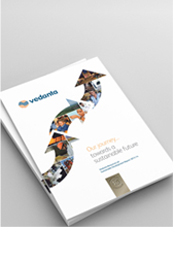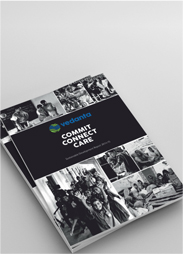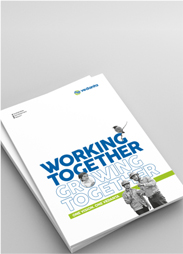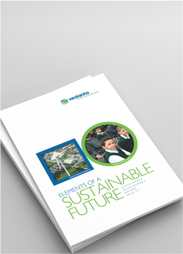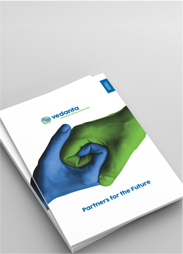OUR STRATEGY AND APPROACH
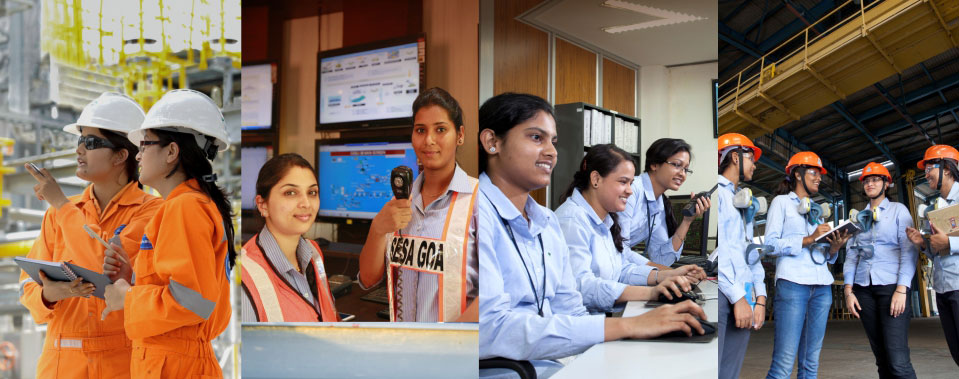

Our strategy continues to focus on delivering long-term value and growth to our shareholders through a diversified portfolio of large, long-life and low-cost assets. We want to achieve this while upholding the principles of sustainable development.
At Vedanta, we understand the value of a unified sustainable development agenda that goes beyond compliance. Though each of our subsidiary businesses operate independently under a federal structure, we have developed the Vedanta Sustainability Framework, which is integral to the core business and risk management strategy.
Developed keeping in mind multiple internal and external sustainability imperatives like materiality and core values of Vedanta, UNGC's 10 Principles, United Nation's SDGs, standards set by International Finance Corporation (IFC), ICMM and OECD, our Sustainable Development Model comprises four pillars - responsible stewardship, building strong relationships, adding and sharing value, and strategic communications.
APPROACH
The Vedanta Sustainability Framework is central to our sustainability agenda. It has allowed the Group to operationalise the intent that is centred on our four strategic pillars of: Responsible Stewardship, Building Strong Relationships, Adding and Sharing Value, and Strategic Communications.
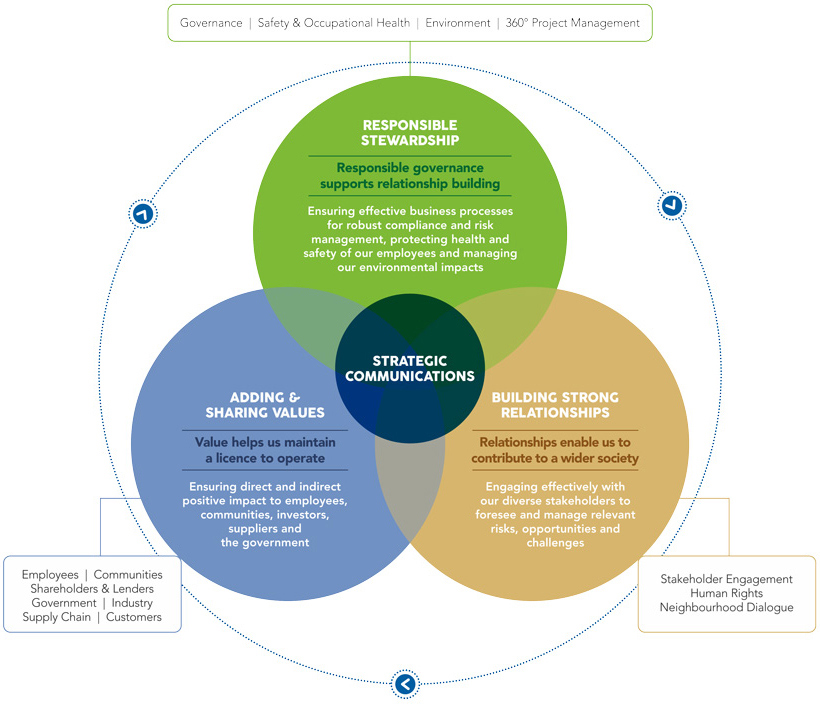
These four pillars are critical to ensuring the long-term successful future of our business - meeting our strategic goals of growth, long-term value and sustainability
For further details on Vedanta Sustainability Framework, refer to Governance Section
MATERIALITY
Materiality assessment helps us maintain the relevancy and credibility of the report, and ensures that it remains focused on what matters. Our materiality process is in line with Global Reporting Initiative (GRI) standards. We seek to identify the issues most important to our stakeholders and our business, and prioritise our interventions accordingly.
Two years ago, Vedanta identified and prioritised those issues that are most material to our business. We sought the views of a diverse group of stakeholders and their responses were presented to our management group, who then prioritised the most important issues for our business.
Material Aspects
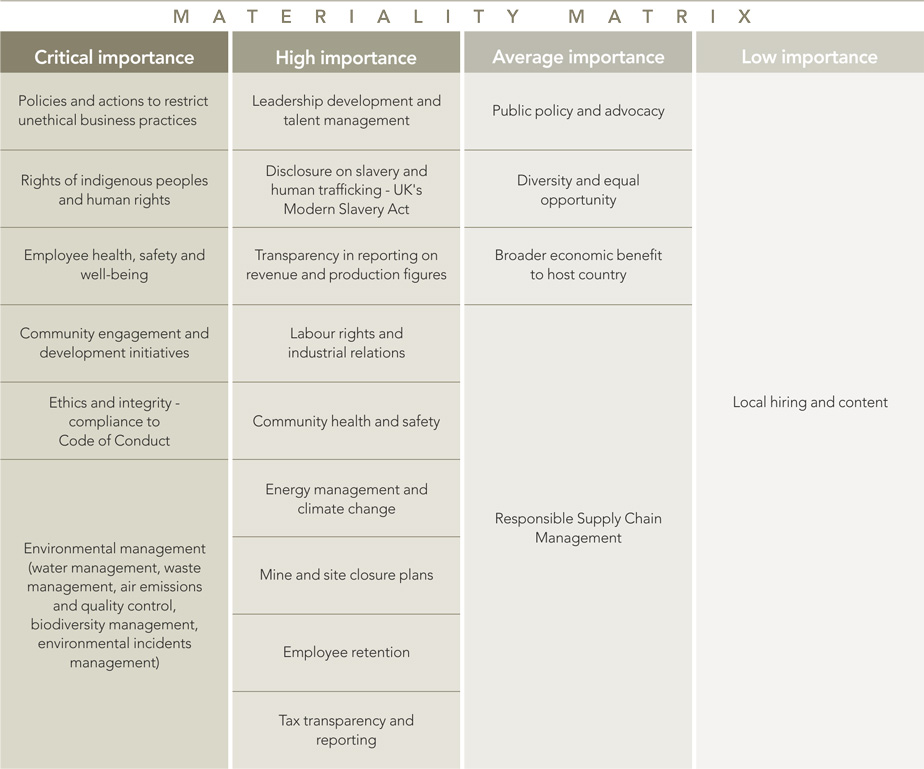
This materiality matrix is reviewed and ratified by both the Executive Committee (EXCO) and the Sustainability Committee.
During the year, we continued our efforts to improve our systems and their performance in all the key issues identified in the matrix through our Sustainability Framework. As the year progressed, the following material areas emerged as the most significant drivers of our business - commanding either management or stakeholder attention:
 |
THE SAFETY OF OUR WORKFORCE |
 |
ENVIRONMENTAL MANAGEMENT |
 |
RETAINING OUR SOCIAL LICENCE TO OPERATE |
 |
DIVERSITY OF OUR WORKFORCE AND EQUAL OPPORTUNITIES |
 |
THE SAFETY OF OUR WORKFORCE |
 |
ENVIRONMENTAL MANAGEMENT |
 |
RETAINING OUR SOCIAL LICENCE TO OPERATE |
 |
DIVERSITY OF OUR WORKFORCE AND EQUAL OPPORTUNITIES |
ROADMAP & PROGRESS
|
OBJECTIVES AND TARGETS
FY 2017-18 |
Status
|
Performance
FY 2017-18 |
Objectives & Targets
FY 2018-19 |
| OCCUPATIONAL HEALTH & SAFETY | |||
|
Achieve score >75% in six safety performance standards
|

|
|
Achieve score >75% in six safety performance standards
|
|
Extend baseline health assessment across businesses
|

|
Hindustan Zinc, Sterlite Copper, Cairn Oil & Gas, KCM and BALCO have completed their initial exposure survey |
|
|
Zero fatal incidents and 26% reduction in Lost Time Injury Frequency Rate (LTIFR)
|

|
9 fatalities occurred in the fiscal year. LTIFR improved from 0.39 to 0.34 -a reduction of ~13%
|
Zero fatal accidents and an LTIFR of 0.30
|
| ENVIRONMENT MANAGEMENT | |||
|

|
|
Achieve water saving of 4.0 million m3
|
|
Compliance with environmental and social management plan for new projects across the business
|

|
Work in progress
|
|
|
Complete Biodiversity Management Plan at our Oil & Gas business
|

|
BMP study complete
|
|
|
Achieve 50% of fly ash utilisation rate
|

|
90% of the generated fly ash utilised |
Achieve fly ash utilisation of 75%
|
|
We are considering formal GHG reduction targets and we expect to achieve a 16% reduction in carbon intensity by 2020 from a 2012 baseline, which was the first year of audited data
|

|
~14% reduction achieved in GHG intensity over baseline of 2012
|
Continue our reduction trajectory and formalise our GHG intensity reduction target
|
|
Energy Saving: 1.39 million GJ
|

|
Energy saving of 2.6 million GJ achieved
|
Achieve 2 million GJ energy saving
|
|
Complete the dam break analysis of the identified facilities across businesses
|

|
|
Develop capability and facilitate strengthening of tailing management practices across the Group
|
|
Initiate the capacity-building of selected professionals on biodiversity
|

|
Not initiated
|
|
| RETAINING OUR SOCIAL LICENSE TO OPERATE | |||
|
Social impact studies to be continued for remaining sites
|

|
Partnered with an independent expert to conduct baseline, need, impact and SWOT assessments in all businesses. Work is under way
|
Complete the baseline and social impact assessments in all businesses
|
|
Increase the implementation and utilisation rate of the SAP system
|

|
|
|
|
Expand the company's flagship Nandghar CSR programme to all our businesses
|

|
Nandghars constructed: 54 in FY 2017-18; 154 till date; 250 under construction
|
250 Nandghars to be constructed in FY 2018-19 and planning for additional 1,000 to be completed.
|
|
Embed and encourage employee volunteering for social initiatives
|

|
|
Develop employee engagement as a standard policy for the group
|
| PEOPLE AND DIVERSITY | |||
|
Employee scorecard coverage to be extended to 100% of the professional employees
|

|
Target completed
|
|
|
Ensure 100% coverage of code of conduct training for all new professional employees
|

|
95.7% of our new hires have received the Code of Conduct training. The balance at KCM will be covered within the initial 12 months of their joining date as per the Code of Conduct training calendar
|
Continue to focus on Code of Conduct training for all professional employees including new hires
|
|
Increase gender diversity by hiring 20% women this financial year
|

|
~21% of all new full-time hires in FY 2017-18 have been women
|
|
|
Achieve 33% female representation at Vedanta Board-level by 2020
|

|
|
|
 Achived Achived  In Progress / Partially achieved In Progress / Partially achieved  Not achieved Not achieved |
|||
SUSTAINABLE DEVELOPMENT JOURNEY
Our sustainable development journey continues to create value for our stakeholders. We have invested our time and resources in introspecting our actions; we have achieved our targets and formulated ambitious new ones; we have adopted global best practices and taken innovative leaps; we have aligned our standards with industry benchmarks and charted some of our own. We have done all this and continue to do it with a singular agenda: ensuring long-term growth for all stakeholders.
SNAPSHOT OF OUR JOURNEY
FY 2013-14
Businesses started embedding Vedanta Sustainable Development Framework
training and implementation of policies and standards
External Review Concluded (URS - Scott Wilson)
all recommendations got successfully closed
Sustainability linked with Remuneration sustainable development KPIs linked to executive remuneration
Vedanta Sustainability Assurance Programme (VSAP) into its Second Year of Implementation
supported by external auditors
FY 2014-15
Environment & Social Review of VSAP Continued external review
VSAP into its Fourth Year of Implementation revised as per the material priorities with more emphasis and focus on safety by inclusion of safety performance standards, supported by external auditors
Advancing Accountability
by incorporating safety performance standards into executive remuneration
Social Impact Assessment Studies - HZL & Cairn India
aligning all community projects with updated studies
FY 2015-16
Environment & Social Review of VSAP Continued external review
VSAP into its Fourth Year of Implementation revised as per the material priorities with more emphasis and focus on safety by inclusion of safety performance standards, supported by external auditors
Advancing Accountability
by incorporating safety performance standards into executive remuneration
Social Impact Assessment Studies - HZL & Cairn India
aligning all community projects with updated studies
FY 2016-17
VSAP and its Implementation
VSAP material priorities identified for FY 2016-17
are occupational health and safety, resource use and management, stakeholder engagement, and supplier and contract management
Social Impact Assessment Studies need-based assessment completed for nearly all our businesses.
The major social impact assessment studies were done at Cairn Oil and Gas Business
Advancing Accountability
employee health, safety and well-being identified as the material issue, is a key priority for the company. Hence, it is addressed by incorporating safety performance standards into executive remuneration
FY 2017-18
Strong Focus on Safety
Alignment across businesses on a collective carbon strategy
Launching a systematic, Group-wide programme to monitor and maintain tailings dams in line with global best practices
Consolidating efforts to drive effective implementation of the provisions of the
Modern Slavery Act across our businesses
Re-evaluating our social performance standards in order to enhance our Social License to Operate


